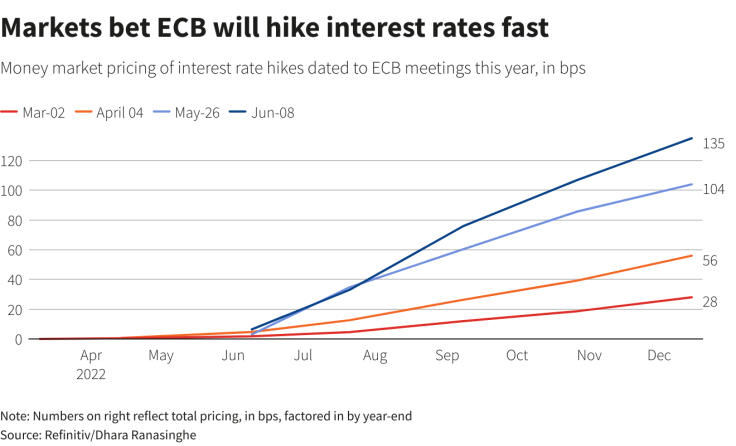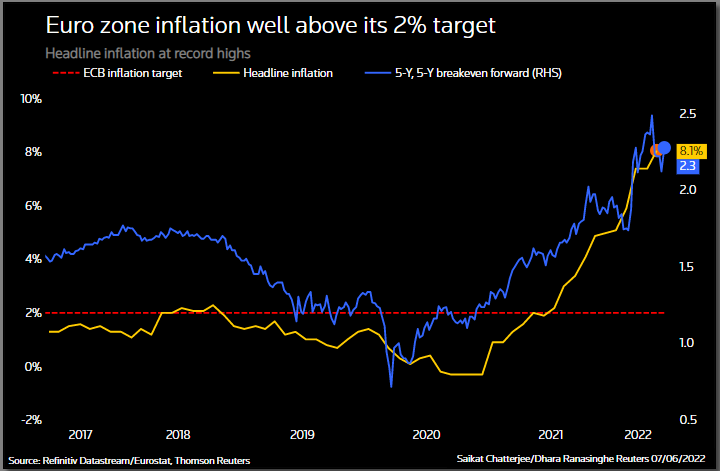Stocks, Euro Slip As ECB Set To Join Rate Hike Club

U.S. and European shares slid and euro zone borrowing costs hit an eight-year high on Thursday after the European Central Bank signaled it will hike interest rates next month for the first time since 2011, a move some said was too slow.
While the ECB decision was widely expected, the possibility of a larger hike from September weighed on sentiment at a time when the euro zone economy is grappling with slowing growth and soaring inflation.
Markets have focused for months on how fast central banks move to curb inflation, with investors expecting the Federal Reserve to hike rates by 50 basis points next week, especially if U.S. CPI data on Friday confirms an elevated reading.
But central bank rate hikes also spell potential trouble and have put investors in a bind, as they could spark slowdowns. The ECB said inflation will remain "undesirably elevated."
Bill Papadakis, a macro strategist at Lombard Odier, said markets see the ECB's policy rate peaking above 2% and lead to slower economic growth.
"We think this would make monetary policy restrictive, and doubt that the euro region's economy could sustain such tight conditions, given its present challenges," Papadakis said.
The ECB's steps to tackle inflation were perceived as dovish after a bigger-than-expected rate hike earlier this week by the Reserve Bank of Australia and signs the Fed will sharply raise rates, said Joe Manimbo, senior market analyst at Western Union Business Solutions.
"The ECB struck a somewhat less hawkish tone and as a result, we've seen the euro zigzag," Manimbo said. "The fact that the ECB is sticking to a gradual rate hike path has been underwhelming for euro bulls."
The euro fell 0.57% to $1.0653 against the dollar, as the dollar index rose 0.4%. But bond yields across southern Europe rose sharply after the ECB flagged a string of rate hikes would ensue.
With euro zone inflation at a record-high 8.1%, the ECB had already flagged a series of moves, including ending its long-running asset buying program at the end of June.
The ECB spelled out plans to raise rates a quarter point next month and probably half a point again in September, which would be the first 50-basis-point move in 22 years.
Robert Alster, chief investment officer at Close Brothers Asset Management, said the ECB was relatively late to the rate hike "party."
"We do not expect more aggressive tightening whilst the war in Ukraine continues to weigh on sentiment," he said.
Bond dealers pushed Germany's 10-year government bond yield - the main proxy for European borrowing rates - to its highest level in eight years at 1.47%. The bund was last down 0.7 basis points to 1.428%.
Yields on the 10-year U.S. Treasury notes rose 1.8 basis points to 3.047%.
The ECB also published new forecasts that raised this year's inflation projections to 6.8% from 5.1% previously, but cut its growth outlook to 2.8% from 3.7% due to sky-high energy and food prices.
Graphic: Markets bet ECB will hike interest rates fast -

With questions about how fast the ECB and other central banks need to move still unanswered, concerns about inflation and the impact on the economy sapped risk appetite.
The pan-European STOXX 600 index lost 1.35% and MSCI's gauge of stocks across the globe shed 0.86%.
On Wall Street, the Dow Jones Industrial Average fell 0.4%, the S&P 500 lost 0.50% and the Nasdaq Composite dropped 0.55%.
European stocks were already on the defensive, led by miners as China imposed new COVID lockdown measures in Shanghai, while the financials sector fared marginally better with banks soon able to charge higher lending rates.
Asian stocks fell overnight. MSCI's broadest index of Asia-Pacific shares outside Japan lost 0.5%, with Australian shares finishing down 1.4% and Seoul's KOSPI flat. Hong Kong's Hang Seng turned around from small gains to fall 0.7% and Chinese A-shares fell 1%.
The other focus for investors was the declining Japanese yen, which dropped to a 20-year low against the dollar of 134.56 before paring some losses. It also neared crucial levels against China's yuan which are highly sensitive for Asia.
A widening policy divergence has weighed on the yen, with the Bank of Japan remaining one of the few global central banks not signaling higher rates at present.
Oil prices slid. U.S. crude recently fell 0.33% to $121.71 per barrel and Brent was at $123.37, down 0.17% on the day.
Graphic: Euro zone inflation is at record highs -

© Copyright Thomson Reuters 2024. All rights reserved.




















